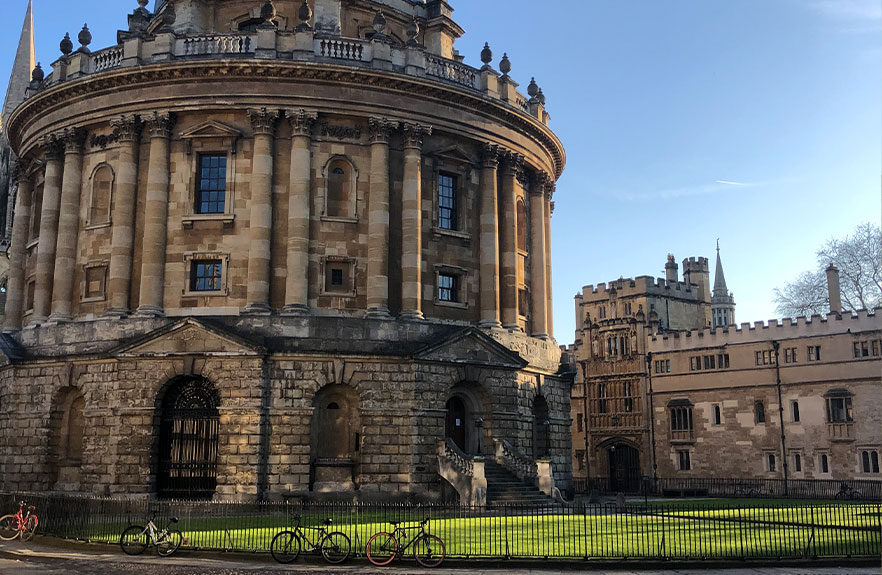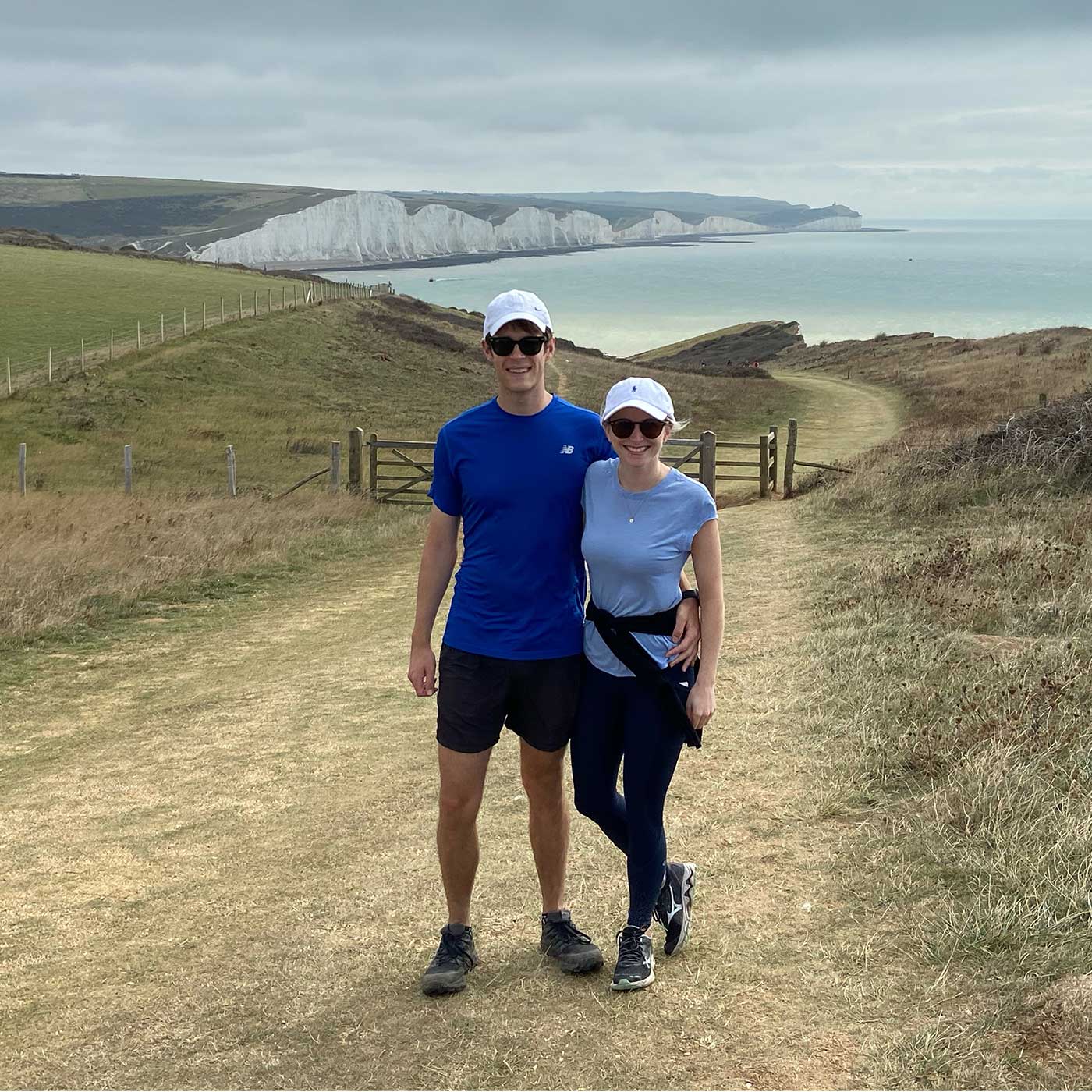Profile
Out of
Oxford
When Otago medical alumni Jonny Stevenson and Claire Munro began their year at Oxford University in September 2019, they had no idea they would find themselves at the coalface of an international response to a global pandemic. Six months after returning to New Zealand, they are taking the learnings from Oxford and embarking on the next stage of their careers in medicine.
Jonny Stevenson describes his year-long stint at Oxford University studying for his MSc in one of the world's leading research institutions as being a year of two definite halves – the era pre-COVID-19 and the months that came after the global pandemic hit.
Awarded Otago University's Rita Gardner Scholarship, a travelling scholarship that enables postgraduate study in medicine, alongside additional funding from the William Georgetti Scholarship and the Nuffield Department of Population Health, Jonny arrived in Oxford in September 2019. Fellow Otago graduate – and now fiancée – Claire Munro was with him, having secured a role as a project manager in the Oxford Vaccine Group.
“The first six months of our time in Oxford allowed us to immerse ourselves in the incredible opportunities on offer at the University,” says Jonny. “During the MSc course I was privileged to learn from global leaders in health research such as Professor Sir Rory Collins, Professor Sir Richard Peto, Professor Dame Valerie Beral and Professor Adrian Hill as well as senior health policy advisors to major organisations including the World Health Organization, the World Bank, the UK Government, the US Centers for Disease Control and the Gates Foundation.”
Born and raised in Christchurch, Jonny Stevenson was always interested in pursuing a career in health care – and studying at the University of Otago. Both parents (his mother is a teacher and his father a doctor) had studied at Otago and Jonny was attracted to medicine because of the “balance of science and working with people”.
He began at Otago in 2009, studying at both the Dunedin and Christchurch campuses before graduating in 2014. In Christchurch he was heavily involved in the Christchurch Medical Students' Association, becoming president in 2014. He says his years at Otago delivered a strong academic foundation and he was empowered to pursue opportunities for study overseas after being awarded the Rita Gardner Scholarship and the Prince of Wales prize as the top undergraduate student at Otago. As both a medical student and junior doctor, he also benefited immensely from mentoring by senior academic clinicians working at Otago, such as Professor Richard Gearry and Associate Professor Liz Dennett.
In 2011, while still in Dunedin, he met Claire Munro, who was studying neuroscience before beginning her medical school training. Like Jonny, she says Otago provided a strong clinical base, while also offering excellent research opportunities through its Health Sciences summer research scholarships programme.
“At medical school, you're exposed to the clinical side of medicine, but the summer studentships gave me an opportunity to engage in medical research. I participated in the summer studentship programme for three consecutive years and each studentship was a valuable learning experience. Because of this programme, I had a good understanding of clinical research which proved very helpful in Oxford.&rdquo.
For Jonny, studying at one of the world's leading research universities alongside a cohort of 25 other students from around the globe was an incredible experience. Add to that the opportunity for Claire to work alongside leading infectious disease researchers and a stream of social events and public seminars from diverse speakers ranging from Nobel Laureates to Calvin Klein and the pair felt extremely lucky to be at Oxford.

One of the last public lectures the couple attended was a talk from the UK's Chief Medical Officer Professor Chris Whitty on the future of health care in the UK. Ironically, given what would unfold in the coming weeks, COVID-19 was only mentioned as a brief appendix to the main talk.
Just a few weeks later, the university was in lockdown.
“Everything changed very suddenly,” Jonny says. “While in lockdown I was allowed out for one hour of exercise per day. I found myself walking around these incredible historical sites in the centre of Oxford and everywhere was deserted. The tourists had all left and the domestic students had been sent home.”
“I found myself walking around these incredible historical sites in the centre of Oxford and everywhere was deserted. The tourists had all left and the domestic students had been sent home.”
Working remotely, Jonny completed his final assessments and moved on to his dissertation – evaluating the association between hearing impairment and dementia in the UK Biobank – a world-renowned longitudinal study. His findings, which are currently being submitted for publication, may have important implications for the treatment of age-related hearing impairment and the prevention of dementia. Despite the disruption, Jonny was awarded distinction for the MSc and named as the top student in the MSc cohort.
While Jonny's experience of COVID-19 can be defined by isolation, Claire's was demanding.
“Before COVID, my colleagues and I maintained a work-life balance. Afterwards, I think many would agree that was not always the case,” says Claire.
The Oxford Vaccine Group pivoted to focus on a COVID-19 vaccine with Claire redeployed to a number of roles at the heart of the Oxford COVID-19 vaccine trial, including co-ordinating the Data and Safety Monitoring Board and the trial steering committee (of which Professor David Murdoch – the Dean of the University of Otago, Christchurch – is a member) and was involved in setting up trial sites around the UK.
“The team didn't have much time away from work. There was just so much to be done,” says Claire. “Some weeks we were there most days, but it didn't feel onerous because there was an absolute goal in mind. I loved waking up every morning and going to work with this amazing group of people.”
As the virus spread, the couple watched anxiously to see how New Zealand would fare.
“New Zealand's response has been exemplary,” Jonny says. “We were watching the situation in New Zealand very carefully and would have considered coming back earlier if things had gotten any worse in New Zealand.&rdquo.
Claire agrees, saying the Oxford experience was a “once in a lifetime opportunity” but that they didn't consider staying longer in the UK.
“We had a great time away, but we were really excited to be coming home. We're both looking forward to returning to clinical work and getting on with the next phase of our careers.”
For the couple, that means a new home for the year in Palmerston North, and a further three years of GP training for Claire and five years for Jonny in ear, nose and throat surgical training. They also recently got engaged.
Jonny says a key theme highlighted during the global pandemic response has been the immense importance of high-quality medical research and well-informed health policy.
“Our experience over the past year has offered us a unique perspective on the unfolding pandemic and has ultimately reaffirmed our aspirations. Long term, I'd like to work at the interface of clinical practice, research and health policy – and work towards improving health outcomes for all New Zealanders.&rdquo.
Claire also hopes to combine clinical work with research or health policy, but for now she is focused on returning to clinical work, which she has missed during her time away.
“The past eighteen months have given me an insight into the world outside of clinical medicine. While I have loved this time, it is great to be back working clinically. Being a doctor is a rewarding career and we both feel fortunate to be doing what we do.”
AMIE RICHARDSON
Jonny Stevenson and Claire Munro: “Our experience over the past year has offered us a unique perspective on the unfolding pandemic and has ultimately reaffirmed our aspirations.”

